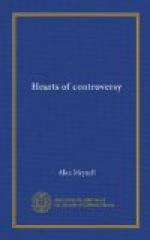Wit, humour, derision—to each of these words we assign by custom a part in the comedy of literature; and (again) those who do not read Dickens—perhaps even those who read him a little—may acclaim him as a humourist and not know him as a wit. But that writer is a wit, whatever his humour, who tells us of a member of the Tite Barnacle family who had held a sinecure office against all protest, that “he died with his drawn salary in his hand.” But let it be granted that Dickens the humourist is foremost and most precious. For we might well spare the phrase of wit just quoted rather than the one describing Traddles (whose hair stood up), as one who looked “as though he had seen a cheerful ghost.” Or rather than this:-
He was so wooden a man that he seemed to have taken his wooden leg naturally, and rather suggested to the fanciful observer that he might be expected—if his development received no untimely check—to be completely set up with a pair of wooden legs in about six months.
Or rather than the incident of the butcher and the beef-steak. He gently presses it, in a cabbage leaf, into Tom Pinch’s pocket. “‘For meat,’ he said with some emotion, ‘must be humoured, not drove.’”
A generation, between his own and the present, thought Dickens to be vulgar; if the cause of that judgement was that he wrote about people in shops, the cause is discredited now that shops are the scenes of the novelist’s research. “High life” and most wretched life have now given place to the little shop and its parlour, during a year or two. But Dr. Brown, the author of Rab and His Friends, thought that Dickens committed vulgarities in his diction. “A good man was Robin” is right enough; but “He was a good man, was Robin” is not so well, and we must own that it is Dickensian; but assuredly Dickens writes such phrases as it were dramatically, playing the cockney. I know of but two words that Dickens habitually misuses, and Charles Lamb misuses one of them precisely in Dickens’s manner; it is not worth while to quote them. But for these his English is admirable; he chooses what is good and knows what is not. A little representative collection of the bad or foolish English of his day might be made by gathering up what Dickens forbore and what he derided; for instance, Mr. Micawber’s portly phrase, “gratifying emotions of no common




